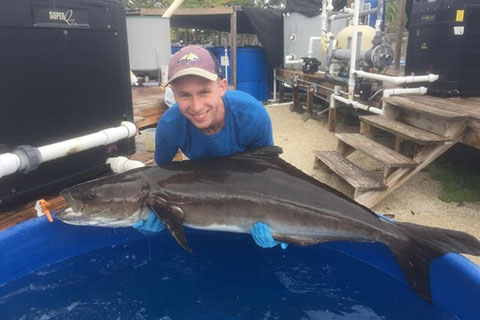
Ian Zander
Track: Aquaculture Management - MES
Graduated: Fall 2018
What is your current job/project and main responsibilities? Please tell us as much as you like about what you are doing.
I am currently the fish production and laboratory manager at Hubbs SeaWorld Research Institute in San Diego, California. We raise California Yellowtail as a candidate species for sustainable offshore aquaculture and California Halibut for stock replenishment purposes. My primary responsibility is the management of the husbandry of our fish; from egg to breeding adult. In addition to overseeing daily operations I assist with the design and execution of experiments, development of fish husbandry and larval rearing protocols, fish health monitoring and treatment, and maintenance and upkeep of our seawater intake systems.
What was your MPS track?
Aquaculture Management - MES
What are your favorite Rosenstiel School memories?
There are too many to count! Some that stand our more than others are my volunteer days at the experimental fish hatchery, nights at the Wetlab enjoying time with friends and colleagues, and the many hours I spent studying in the library with fellow students.
Tell us about your MPS internship, and in what ways did it help you develop professional skills and connections?
I interned at a commercial sablefish hatchery on a small island off the coast of British Columbia, Canada. Here I worked as a fish technician and was responsible for live fish feed production and larval fish husbandry. In addition to my work duties I conducted research for the company on the mineral and fatty acid composition of captive and wild sablefish broodstock eggs. The primary aim of this study was to identify any nutritional discrepancies in our broodstock and larval feeding protocols in hopes of improving annual fish production.
My experience in Canada not only introduced me to the daily workings of a commercial fish farm, but helped me gain expertise in live feed production and risk management that has translated well to my current job position. My host organization was kind enough to allow me to participate in nearly all facets of operating a commercial fish hatchery which provided invaluable insight into what working in the industry was really like.
What were your favorite classes at Rosenstiel School and why?
Two of my favorite classes at Rosenstiel School were fisheries socioeconomics and management and environmental fish physiology. In my socioeconomic course I enjoyed gaining a more thorough understanding of how fisheries are regulated from a socioeconomic perspective, especially as aquaculture becomes a more prevalent source of seafood. Having insight on the effects that an aquaculture business may have to other industries is incredibly important when considering new business ventures.
In aquaculture one of the most important skills is understanding how the environment you are raising fish in effects their health. My environmental fish physiology course helped me understand how a fish responds physiologically to environmental conditions, which at first is often counterintuitive. Understanding this makes my job easier because I can change the environment my fish are living in to optimize their health and performance.
What piece of advice would you give to current or incoming MPS students?
Participate in everything you can during your time at Rosenstiel School . Make your studies a priority and Rosenstiel School your home during your time in Miami. In addition to all of your course work, one of the most valuable things you will leave with is the network of professionals you will develop. Talk to everyone! If you are studying aquaculture be sure to volunteer at the experimental fish hatchery across the street. You will learn invaluable skills there that nearly every employer in the industry looks for when making a hire. In your free time don’t forget to experience some of Miami; tropical fruit and coffee will never be the same!




